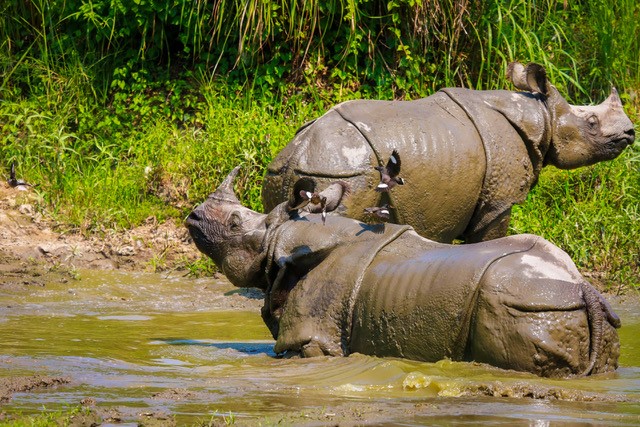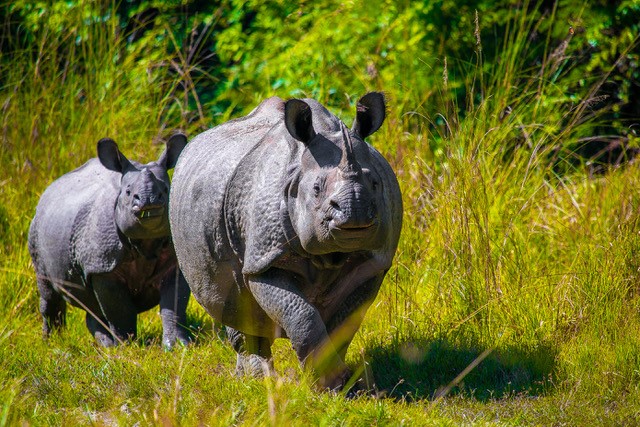What actions played a crucial role in curbing the rhinoceros poaching in Nepal?
Kathmandu Institute of Applied Sciences press release.
Nepal has almost eliminated rhinoceros poaching by building community trust, inter-agency coordination and cooperation, enhanced law enforcement and better-training of enforcement staff in criminal investigation and prosecutions. A perspective article published in Journal of Applied Ecology discusses these achievements.

The paper titled “Policy and management actions that resulted in curbing rhinoceros poaching”, is written by Nepal’s leading conservation practitioners who worked in the rhinoceros strongholds as staff at Department of National Parks and Wildlife Conservation (DNPWC) and played critical roles in developing national policies and strategies.
Dr. Krishna Prasad Acharya, the lead author who worked past 25 years at Ministry of Forest and Environment, including as a Director General of the DNPWC and the Department of Forests, points out: “Inter-agency coordination brought together the strengths of each stakeholder, making it possible to carryout effective anti-poaching campaigns”.
According to Dr. Prakash K Paudel, Senior Scientist at Center for Conservation Biology, Kathmandu Institute of Applied Sciences (KIAS) and the corresponding author of the paper:“Rhinoceros trade networks operate through well-organized criminal syndicates well-beyond park boundaries. Nepal’s experience in dismantling rhinoceros trade networks and involving local people in anti-poaching campigns may be important lessons in other parts of world”.
Authors on the paper include Krishna Prasad Acharya, Ramesh Kumar Thapa, Kamal Jung Kuwar, Bishnu Prasad Thapalia, Prakash Kumar Paudel.

The rhinoceros’ population in Nepal has gone through several highs and lows over the past century. It risked complete elimination in the 1960s but made a successful comeback in the later years. In 2001 the population of rhinoceros had reached 612, which later drastically plummeted down with the increase of poaching.
2012 was a memorable year in the conservation history of Nepal. The country achieved a major milestone by completing a year without a single case of poaching of greater one-horned rhinoceros (Rhinoceros unicornis). So far, Nepal has succeeded in achieving six zero poaching years over the last 9 years (January 03, 2011 and January 02, 2020). A ‘zero poaching year’ denotes a continuous 365-day period with no report of purposeful killing of rhinoceros by humans. The paper highlights the following key actions that contributed to a drastic reduction of rhinoceros poaching:
- Effective implementation of laws
- Better coordination among stakeholders that resulted enhance ownership and shared responsibility
- Increased security in protected areas by Nepal Army
- Increased prosecution by Nepal Police and dismantle of trade network
- Formulation of community based anti-poaching campaign
The authors call for a continued commitment from leadership to sustain the past achievements. Frontline conservation staff are at urgent need of motivation in form of training, logistics support and opportunities for career growth, including better pay grades.
You can read the article for free here:
, , , , . Policy and management actions that resulted in curbing rhinoceros poaching. J Appl Ecol. 2020; 00: 1– 7. https://doi.org/10.1111/1365-2664.13692
Media contact:
Prakash K Paudel, PhD
Center for Conservation Biology, Kathmandu Institute of Applied Sciences
Email: pk.paudel@gmail.com/pkpaudel@gmail.com
Like what we stand for?
Support our mission and help develop the next generation of ecologists by donating to the British Ecological Society.